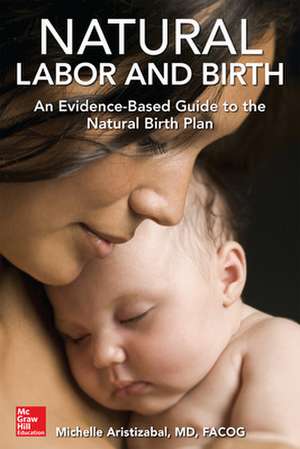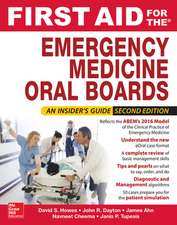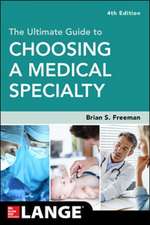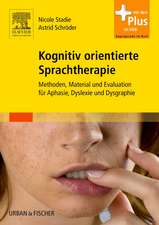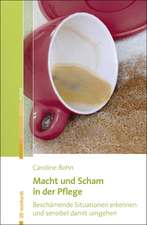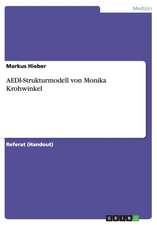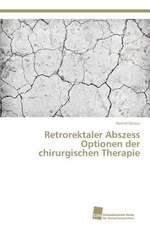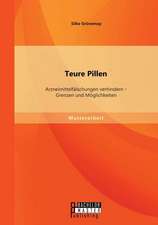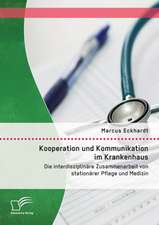Natural Labor and Birth: An Evidence-Based Guide to the Natural Birth Plan
Autor Michelle Aristizabalen Limba Engleză Paperback – 11 oct 2018
The first evidence-based book covering natural childbirth practices written by an obstetrician
Natural birth plans have emerged as a battle cry of resistance among women who are dissatisfied with today’s medically-aggressive model of maternity care and high cesarean section rates. However, natural birth does not need to be a source of controversy or conflict between women and their nurses and doctors.
Natural Labor and Birth: An Evidenced-Based Guide to the Natural Birth Plan seeks to broaden the medical community’s understanding of the motivations and needs of naturally laboring mothers, while also exploring why natural birth is often so difficult to achieve within our current system and what can be done to change that. It is a complete resource on the topic of natural childbirth, teaching healthcare providers and other birth workers the skills necessary to assist a woman through an unmedicated birth and reviewing the compilation of medical evidence in support of those methods. It demonstrates how natural birth can exist within the framework of traditional antepartum care and hospital deliveries, and offers alternative solutions to common challenges that often disrupt the physiologic birth process.
Natural Labor and Birth: An Evidenced-Based Guide to the Natural Birth Plan is also an unbiased resource for pregnant women seeking a more thorough and scientific understanding of unmedicated birth. This guide will help women and their partners make their own birth plans from a truly informed place. It will help women understand the barriers they may face when seeking a natural birth and give them the ability to better communicate their needs and preferences.
By creating room for natural birth within our maternity system, this book will help readers build a community of care where all women feel respected, acknowledged, and empowered during their birth experience.
More information on the author can be found at http://www.naturallaborandbirth.com/authors-blog
Preț: 215.48 lei
Preț vechi: 304.09 lei
-29% Nou
Puncte Express: 323
Preț estimativ în valută:
41.24€ • 42.89$ • 34.04£
41.24€ • 42.89$ • 34.04£
Carte tipărită la comandă
Livrare economică 11-22 aprilie
Preluare comenzi: 021 569.72.76
Specificații
ISBN-13: 9781259862878
ISBN-10: 1259862879
Pagini: 352
Dimensiuni: 158 x 229 x 18 mm
Greutate: 0.47 kg
Editura: McGraw Hill Education
Colecția McGraw Hill / Medical
Locul publicării:United States
ISBN-10: 1259862879
Pagini: 352
Dimensiuni: 158 x 229 x 18 mm
Greutate: 0.47 kg
Editura: McGraw Hill Education
Colecția McGraw Hill / Medical
Locul publicării:United States
Cuprins
Section 1: Patient-Driven Change
1. Why the Medical Community Needs to Embrace the Natural Birth Movement
2. Current Barriers to Natural Birth
3. What Women are Saying
4. Midwives and Natural Birth
Section 2: The Natural Birth Plan
5. Environment for Birth
a. Out-of-hospital birth: Home birth and birthing centers
b. Maternal stress response and effects on labor
c. Support of the laboring mother and benefits of doula care
6. Labor Management
a. Minimizing labor induction
b. Supporting ambulation during labor
c. Safety of intermittent fetal monitoring and alternative monitoring protocols
d. Benefits of amniotomy as an augmentation technique
e. Review of the evidence for routine use of Pitocin in labor and indicated Pitocin for protracted labor
f. Review of the evidence for minimizing cervical exams during labor
g. Safety and benefit of intrapartum eating and drinking
h. IV hydration and concerns regarding its routine use
7. Pain Management
a. The Epidural: Associated patient satisfaction, efficacy, safety, and cesarean section rates
b. Hydrotherapy: Efficacy of using showers and immersion tubs for comfort during labor
c. Comfort Positions and Breathing Techniques: Efficacy in achieving an unmedicated birth
8. Delivery
a. Positions for Delivery: Benefits and concerns of traditional and alternative positions
b. Water Birth: Review of evidence
c. Self-Directed Pushing vs. Coached, Valsalva Pushing
d. Delayed Cord Clamping
9. Post Delivery Mother and Infant Care
a. Immediate Skin-to-Skin Contact: Benefits for initiating breast feeding
b. Post-Delivery Pitocin: Indic
1. Why the Medical Community Needs to Embrace the Natural Birth Movement
2. Current Barriers to Natural Birth
3. What Women are Saying
4. Midwives and Natural Birth
Section 2: The Natural Birth Plan
5. Environment for Birth
a. Out-of-hospital birth: Home birth and birthing centers
b. Maternal stress response and effects on labor
c. Support of the laboring mother and benefits of doula care
6. Labor Management
a. Minimizing labor induction
b. Supporting ambulation during labor
c. Safety of intermittent fetal monitoring and alternative monitoring protocols
d. Benefits of amniotomy as an augmentation technique
e. Review of the evidence for routine use of Pitocin in labor and indicated Pitocin for protracted labor
f. Review of the evidence for minimizing cervical exams during labor
g. Safety and benefit of intrapartum eating and drinking
h. IV hydration and concerns regarding its routine use
7. Pain Management
a. The Epidural: Associated patient satisfaction, efficacy, safety, and cesarean section rates
b. Hydrotherapy: Efficacy of using showers and immersion tubs for comfort during labor
c. Comfort Positions and Breathing Techniques: Efficacy in achieving an unmedicated birth
8. Delivery
a. Positions for Delivery: Benefits and concerns of traditional and alternative positions
b. Water Birth: Review of evidence
c. Self-Directed Pushing vs. Coached, Valsalva Pushing
d. Delayed Cord Clamping
9. Post Delivery Mother and Infant Care
a. Immediate Skin-to-Skin Contact: Benefits for initiating breast feeding
b. Post-Delivery Pitocin: Indic
